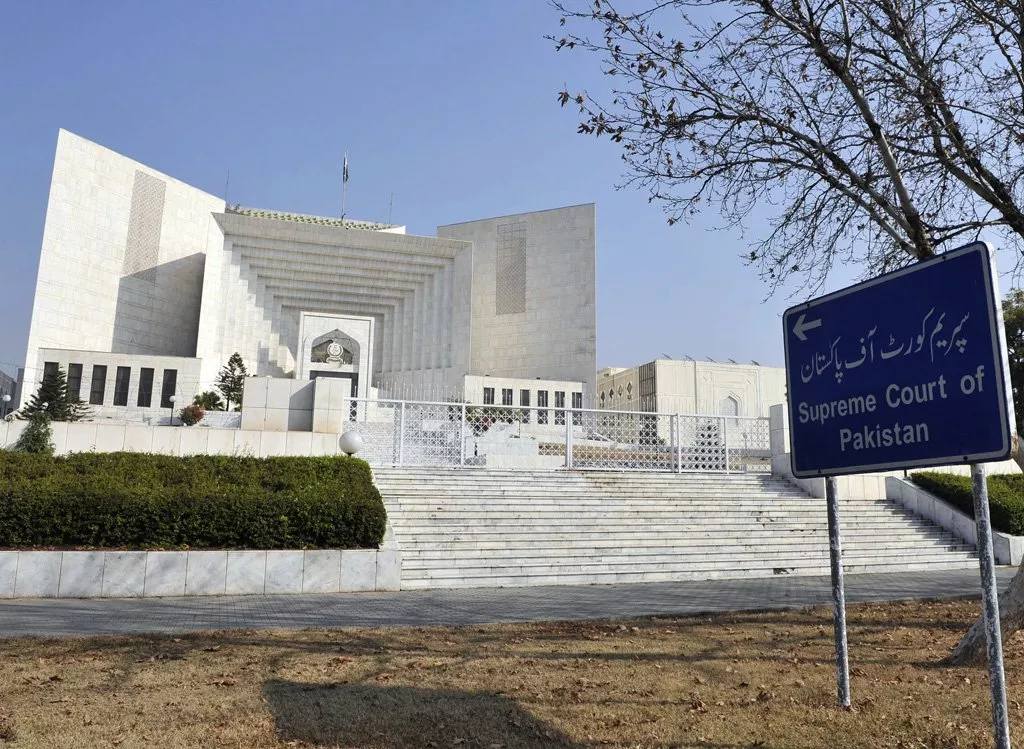Top court moved against IHC order to free UTPs
CJP forms five-member larger bench to hear plea on 30th
ISLAMABAD:The Islamabad High Court’s decision to release over 400 under-trial prisoners (UTPs) from Adiala Jail to prevent the outbreak of the novel coronavirus in the prison was challenged in the Supreme Court on Friday.
The petition against the IHC’s March 20 order was filed by Raja Muhammad Nadeem through his counsel Nayyab Gardezi under Article 185(3) of the Constitution.
Interestingly, soon after the submission of the petition, Chief Justice of Pakistan Gulzar Ahmed formed a five-member larger bench headed by himself to hear the plea on March 30.
However, representatives of superior bars have expressed serious concerns over the immediate fixing of the petition for hearing.
They are wondering as to why the petitioner had not filed an intra-court appeal. They have also questioned the urgency behind fixing the petition so quickly for hearing.
It has been learnt that the superior bars would give their reaction today (Saturday)
The petitioner stated that over 400 criminals were released in an unprecedented and unconstitutional manner at the cost and expense of the constitutional right of a complainant in the respective FIRs.
The IHC had sought a report from the Rawalpindi Central Prison superintendent on the inmates whose cases were pending before the courts under jurisdiction of the court and accordingly a report was submitted to it.
The superintendent informed the IHC in the report that the authorised occupancy of the prison was 2,174, while the present number of its inmates was 5,001.
The number of UTPs whose cases were pending before the courts under the jurisdiction of the IHC was 1,362. Most of them have allegedly committed offences which fall within the ambit of the non-prohibitory clause; and several convicted prisoners were above the age of 55 years and some suffered from serious illnesses, which could not be treated while being incarcerated.
According to the petitioner, the IHC chief justice exercising suo moto jurisdiction converted the report into a petition under Section 561 A of the Criminal Procedure Code on the grounds that a national calamity had been declared by the federal government in the wake of coronavirus threat and that the situation in the overcrowded prisoners in the Adiala Jail was alarming.
The petitioner contended that the IHC was not vested with the jurisdiction to exercise any suo motu powers, thus the impugned judgment and order was illegal, without any jurisdiction and was liable to be set aside on these grounds.
The inherent powers vested in the high court could only be exercised in a situation where no express statutory provision was available and the remedy under Section 561 A CrPC was not an alternate and substitute for an express remedy as provided under the law, he added.
He stated that impugned judgment is also against the concept of the trichotomy of powers between the legislature, executive and the judiciary.
“This principle underpins the rationale that forming a government policy is to be undertaken by the executive, which is in a better position to decide on account of its mandate, experience, wisdom and sagacity which are acquired through diverse skills,” the petition read.
“The judiciary on the other hand is entrusted with the task of interpreting the law and to play the role of an arbiter in cases of dispute between the individuals inter se and between individual and the state.”
The petitioner further stated that in the instant case, the provincial government was empowered under the Pakistan Prison Rules, 1978 read with Section 401 of CrPC to suspend the sentence. However, the Islamabad Capital Territory administration did not find it expedient to come forward and invoke the provisions
“The ambit and scope of High Court powers is not as wide as of the Supreme Court under Article 187 of the Constitution to pass any order or to issue any direction or degrees for doing substantial justice.”
The petition also mentioned the recent meeting of National Judicial Policy Making, wherein no decision was made about the release of prisoners.
It is also stated that high court order is in violation of of Articles 10-A and 4 of the Constitution.
SC hearing
Raising questions over the release of UTPs by the high courts to prevent them from contracting coronavirus, the Supreme Court noted that courts did not grant bail on the basis of a policy but only in accordance with law.
A two-member bench, comprising Justice Mushir Alam and Justice Qazi Muhammad Amin, rejected granting bail to an accused on the basis of the delay in trial.
Mir Masood Sattar faces charges of corruption and is behind bars for a year.
The counsel for the accused told the court that as a matter of policy due to the viral outbreak, high courts were granting bail to prisoners in offences wherein the sentence was not more than 10 years.
The bench noted that the courts granted bail in accordance with the law rather than a policy.
Justice Amin also questioned whether Italy, France and the US had released prisoners due to the outbreak.
The apex court ordered the government to conduct full screening of all prisoners as a precautionary measure.


COMMENTS
Comments are moderated and generally will be posted if they are on-topic and not abusive.
For more information, please see our Comments FAQ